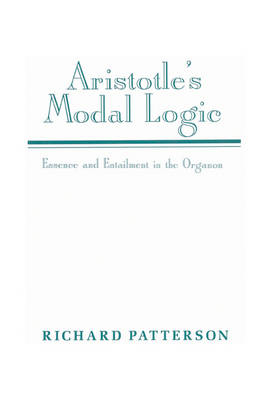
Aristotle's Modal Logic
Essence and Entailment in the Organon
Seiten
2002
Cambridge University Press (Verlag)
978-0-521-52233-5 (ISBN)
Cambridge University Press (Verlag)
978-0-521-52233-5 (ISBN)
Aristotle was both a great metaphysician and the inventor of logic, including the logic of possibility and necessity. Aristotle's Modal Logic, first published in 1995, presents a new interpretation of Aristotle's logic by arguing that a proper understanding of the system depends on an appreciation of its connection to the metaphysics.
Aristotle's Modal Logic, first published in 1995, presents an interpretation of Aristotle's logic by arguing that a proper understanding of the system depends on an appreciation of its connection to the metaphysics. Richard Patterson develops three striking theses in the book. First, there is a fundamental connection between Aristotle's logic of possibility and necessity, and his metaphysics, and that this connection extends far beyond the widely recognised tie to scientific demonstration and relates to the more basic distinction between the essential and accidental properties of a subject. Second, Aristotle's views on modal logic depend in very significant ways on his metaphysics without entailing any sacrifice in rigour. Third, once one has grasped the nature of the relationship, one can understand better certain genuine difficulties in the system of logic and appreciate its strengths in terms of the purposes for which it was created.
Aristotle's Modal Logic, first published in 1995, presents an interpretation of Aristotle's logic by arguing that a proper understanding of the system depends on an appreciation of its connection to the metaphysics. Richard Patterson develops three striking theses in the book. First, there is a fundamental connection between Aristotle's logic of possibility and necessity, and his metaphysics, and that this connection extends far beyond the widely recognised tie to scientific demonstration and relates to the more basic distinction between the essential and accidental properties of a subject. Second, Aristotle's views on modal logic depend in very significant ways on his metaphysics without entailing any sacrifice in rigour. Third, once one has grasped the nature of the relationship, one can understand better certain genuine difficulties in the system of logic and appreciate its strengths in terms of the purposes for which it was created.
1. Introduction; 2. The Basic Modal Proposition; 3. Syllogisms with Two Necessity Premises; 4. Mixed syllogisms: One Assertoric and One Necessity Premise; 5. Two-way possibilities: some basic preliminaries; 6. Two-way possibility syllogisms; 7. Aristotle's perfect syllogisms; 8. Principles of construction.
| Erscheint lt. Verlag | 22.8.2002 |
|---|---|
| Zusatzinfo | 3 Line drawings, unspecified |
| Verlagsort | Cambridge |
| Sprache | englisch |
| Maße | 154 x 229 mm |
| Gewicht | 600 g |
| Themenwelt | Geisteswissenschaften ► Philosophie ► Logik |
| Geisteswissenschaften ► Philosophie ► Philosophie Altertum / Antike | |
| ISBN-10 | 0-521-52233-1 / 0521522331 |
| ISBN-13 | 978-0-521-52233-5 / 9780521522335 |
| Zustand | Neuware |
| Haben Sie eine Frage zum Produkt? |
Mehr entdecken
aus dem Bereich
aus dem Bereich
ein Gegenentwurf zum kurzfristigen Denken : so werden wir zu den …
Buch | Hardcover (2023)
REDLINE (Verlag)
18,00 €


